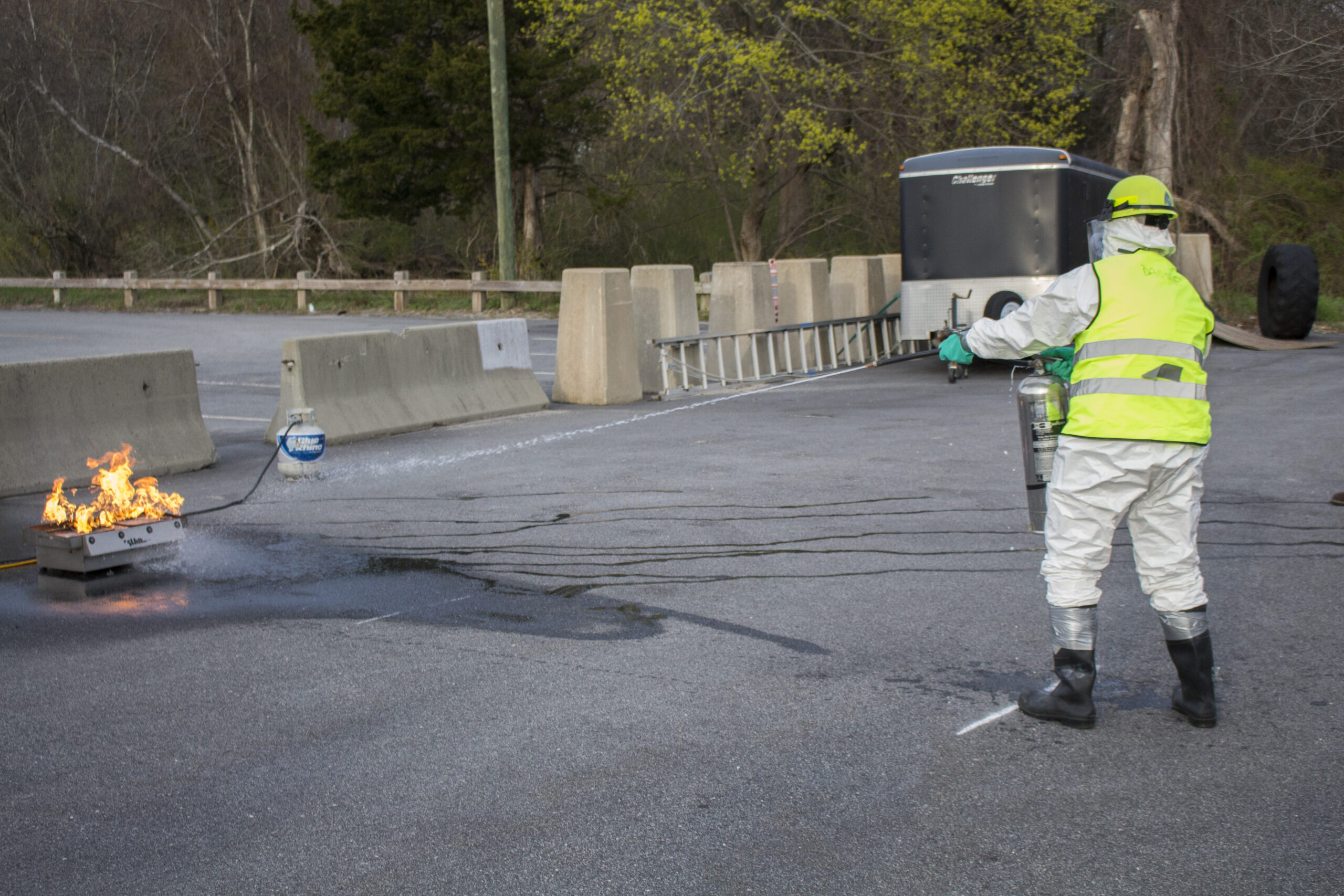URI students got the chance to gear up in Hazmat suits and learn about chemical and fire safety in GEO 587. Photos by James McIntosh.
During this Monday’s GEO 587: Environmental Hazards, Risks, Response and Safety class, students learned how to put out different fires and scope the ground for soil quality and hazardous chemicals.
During the class, which was three hours long, students watched demonstrations and had the opportunity to connect with multiple professionals in environmental-related fields.
According to professor Corey Briggs, the course’s instructor, this was the class’s first opportunity to get out and participate in fieldwork, as it was their first in-person class of the semester. The class has met on Zoom for every other class this semester.
Students were required to wear hazardous material suits for the event, along with boots, safety vests, helmets, gas masks and gloves.
The event started in the back parking lot of the Kingston Fire Department, where the class was split into two groups. One group prepared in the back lot for a fire safety drill where members of the group would practice putting out a fire, while the other group went inside the Kingston Fire Department and learned about their equipment.
Before the drill, students received fire safety advice from URI’s Industrial Hygienist David Moore.
“If you don’t think you can defeat it, get out,” Moore said. “Always call the fire department. They can check to make sure embers and other hazards don’t occur.”
The students were tested on the names of the four types of fire and how to respond to each. Class A fires, which are wood and paper fires, are the most common kind of fire. Class B fire is a liquid fire, which originates from gases and solvents, and cannot be put out with water. Class C fires are electrical fires and Class D fires are metal fires.
While the fire extinguishers used for the drill were filled will water, each was labeled with the fire class it was meant to put out to simulate which extinguisher would need to be used for each type of fire. The students were given different situations to respond to by URI’s Chemical Hygiene Office and Dangerous Goods Shipping Specialist Nick Englehart.
The event turned into a friendly competition, with students racing to put out each fire the fastest.
Students also learned about the Kingston Fire Department and the equipment they use, with firefighter Rachel Gomes, the Kingston Fire Department’s first female firefighter cleared for primary duty. Students met with Gomes in smaller groups to look at one of the department’s trucks and some equipment used by its Hazmat team.
While Gomes is not a part of the Hazmat team, she does work as part of the department’s decontamination team, which often works closely with Hazmat. She described the team’s duties as “heavily based off of what the Hazmat team wants and needs.”
Following the first exhibits, students traveled to Peckham Farm, where representatives from Sage Environmental and Triumvirate Environmental, two companies that deal in environmental consulting, had set up presentations and equipment for the students.
According to Briggs, it was the support of these businesses that allowed the event to be put on and their presence was mutually beneficial for the students and the companies.
“It benefits a lot of people in a lot of ways,” Briggs said. “[The companies] were nice enough to help, and they’re invested, because this is an opportunity for them to see job candidates.”
Students were given earplugs as Thomas Saccoccio, Sage’s senior project manager, and some assistants started up a geoprobe. A geoprobe is a machine that pulls up and samples soil, to check if a plot of soil is stable enough to construct buildings, wells or other structures on top of it.
Saccoccio said that the Direct Push technology has evolved over his years working in the industry to be as non-intrusive and environmentally friendly as possible.
Triumvirate representatives talked to the students about their work, which primarily involves scoping hazardous waste and handling chemicals. According to Triumvirate representative Amy Falcao, the company primarily works with the health care, education, life sciences and industry fields to help keep workplaces clean and safe.
Briggs said the class was made even more special because it was the class’s first time being in-person this semester.
“We’ve been being very, very conscious [about COVID-19] and we have done some interesting things,” Briggs said. “I wanted to get our foundation down, and the weather had to be nice. It all worked out.”
Next Monday, the GEO 587 course will be conducting more in-person activities for their final class of the semester, including container handling, a drone flyover of a Hazmat scene and sampling soil, air and water.





